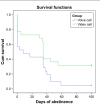A randomized controlled pilot trial of a smoking cessation intervention for US women living with HIV: telephone-based video call vs voice call - PubMed (original) (raw)
A randomized controlled pilot trial of a smoking cessation intervention for US women living with HIV: telephone-based video call vs voice call
Sun S Kim et al. Int J Womens Health. 2018.
Abstract
Background: People living with HIV smoke at a rate three times that of the general population. This randomized controlled pilot trial tested the feasibility and acceptability of a video-call smoking cessation intervention in women living with HIV and its preliminary efficacy compared with a voice-call smoking cessation intervention. The study focused on women due to a paucity of studies among this population, and women are less likely than men to quit smoking when provided with conventional treatment.
Methods: Participants in both arms received an HIV-tailored smoking cessation intervention comprising eight 30-minute weekly counseling sessions in conjunction with active nicotine patches for 8 weeks. The only difference between the two arms was the delivery mode of the intervention: via either telephone-based video or voice call. Survival analysis and a Cox proportional hazard regression model were performed to identify factors predicting 6-month prolonged abstinence from smoking.
Results: A video-call intervention was almost 30% less feasible than a voice-call intervention because women in their 50s and 60s or poorer women living in some southern states did not have access to video-call equipment. However, those who received the video-call intervention were more likely to complete the study than those who had the voice-call intervention. There was no difference in the acceptability of the two interventions. A survival analysis revealed that those in the video arm were significantly more likely to maintain smoking abstinence over the 6-month follow-up period than those in the voice arm (log rank χ 2=4.02, P<0.05).
Conclusion: Although a video-call intervention is less feasible than a voice-call intervention, the former seems to outperform the latter in achieving long-term smoking abstinence for women living with HIV, which may offer an advantage over establishing therapeutic alliance and visually monitoring their adherence to nicotine patches.
Clinical trial registration: ClinicalTrials.gov NCT02898597.
Keywords: HIV; smoking cessation intervention; video call; women.
Conflict of interest statement
Disclosure The authors report no conflicts of interest in this work.
Figures
Figure 1
CONSORT diagram of the study.
Figure 2
Survival analysis of abstinence in video call group vs the voice call group.
Similar articles
- Pilot Randomized Controlled Trial of a Digital Storytelling Intervention for Smoking Cessation in Women Living With HIV.
Kim SS, Lee SA, Mejia J, Cooley ME, Demarco RF. Kim SS, et al. Ann Behav Med. 2020 May 25;54(6):447-454. doi: 10.1093/abm/kaz062. Ann Behav Med. 2020. PMID: 31863582 Free PMC article. Clinical Trial. - A randomized controlled trial of a videoconferencing smoking cessation intervention for Korean American women: preliminary findings.
Kim SS, Sitthisongkram S, Bernstein K, Fang H, Choi WS, Ziedonis D. Kim SS, et al. Int J Womens Health. 2016 Sep 7;8:453-62. doi: 10.2147/IJWH.S109819. eCollection 2016. Int J Womens Health. 2016. PMID: 27660494 Free PMC article. - Feasibility, Acceptability, and Preliminary Effects of a Video-Based Intervention for Smoking Cessation Among People with HIV in Kathmandu, Nepal: A Single-Armed Pilot Study.
Poudel KC, Poudel-Tandukar K, Silwal RC, Chalise BS, Bertone-Johnson ER, Vidrine DJ. Poudel KC, et al. AIDS Behav. 2023 Oct;27(10):3468-3477. doi: 10.1007/s10461-023-04062-8. Epub 2023 Apr 18. AIDS Behav. 2023. PMID: 37071334 - Telephone counselling for smoking cessation.
Stead LF, Hartmann-Boyce J, Perera R, Lancaster T. Stead LF, et al. Cochrane Database Syst Rev. 2013 Aug 12;(8):CD002850. doi: 10.1002/14651858.CD002850.pub3. Cochrane Database Syst Rev. 2013. PMID: 23934971 Updated. Review. - Interventions for Tobacco Cessation in Adults, Including Pregnant Women: An Evidence Update for the U.S. Preventive Services Task Force [Internet].
Patnode CD, Henderson JT, Melnikow J, Coppola EL, Durbin S, Thomas R. Patnode CD, et al. Rockville (MD): Agency for Healthcare Research and Quality (US); 2021 Jan. Report No.: 20-05264-EF-1. Rockville (MD): Agency for Healthcare Research and Quality (US); 2021 Jan. Report No.: 20-05264-EF-1. PMID: 33523610 Free Books & Documents. Review.
Cited by
- Evidence of Phone vs Video-Conferencing for Mental Health Treatments: A Review of the Literature.
Chen PV, Helm A, Caloudas SG, Ecker A, Day G, Hogan J, Lindsay J. Chen PV, et al. Curr Psychiatry Rep. 2022 Oct;24(10):529-539. doi: 10.1007/s11920-022-01359-8. Epub 2022 Sep 2. Curr Psychiatry Rep. 2022. PMID: 36053400 Free PMC article. Review. - Seeing the Value of Video: A Qualitative Study on Patient Preference for Using Video in a Veteran Affairs Telemental Health Program Evaluation.
Chen PV, Helm A, Fletcher T, Wassef M, Hogan J, Amspoker A, Cloitre M, Lindsay J. Chen PV, et al. Telemed Rep. 2021 May 31;2(1):156-162. doi: 10.1089/tmr.2021.0005. eCollection 2021. Telemed Rep. 2021. PMID: 35720740 Free PMC article. - A Scoping Review and Meta-analysis of the Use of Remote Biochemical Verification Methods of Smoking Status in Tobacco Research.
Thrul J, Howe CL, Devkota J, Alexander A, Allen AM, Businelle MS, Hébert ET, Heffner JL, Kendzor DE, Ra CK, Gordon JS. Thrul J, et al. Nicotine Tob Res. 2023 Jul 14;25(8):1413-1423. doi: 10.1093/ntr/ntac271. Nicotine Tob Res. 2023. PMID: 36449414 Free PMC article. Review. - Comparison of Telephone and Video Telehealth Consultations: Systematic Review.
Byambasuren O, Greenwood H, Bakhit M, Atkins T, Clark J, Scott AM, Glasziou P. Byambasuren O, et al. J Med Internet Res. 2023 Nov 17;25:e49942. doi: 10.2196/49942. J Med Internet Res. 2023. PMID: 37976100 Free PMC article. Review. - Transitioning to Remote Clinic Visits in a Smoking Cessation Trial During the COVID-19 Pandemic: Mixed Methods Evaluation.
Mahoney MC, Park E, Schlienz NJ, Duerr C, Hawk LW. Mahoney MC, et al. JMIR Form Res. 2021 Apr 30;5(4):e25541. doi: 10.2196/25541. JMIR Form Res. 2021. PMID: 33878020 Free PMC article.
References
- Palella FJ, Baker RK, Moorman AC, et al. HIV Outpatient Study Investigators Mortality in the highly antiretroviral therapy era: changing causes of death and disease in the HIB outpatient study. J Acquir Immune Defic Syndr. 2006;43(1):27–34. - PubMed
LinkOut - more resources
Full Text Sources
Miscellaneous

